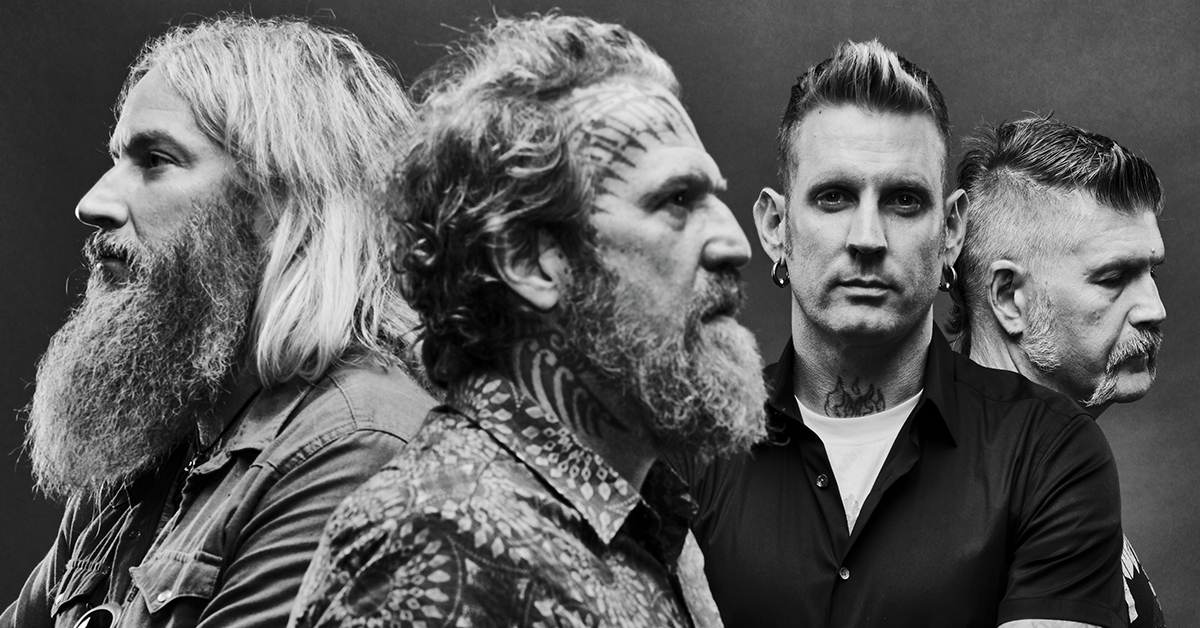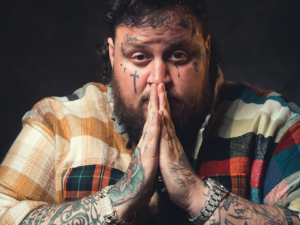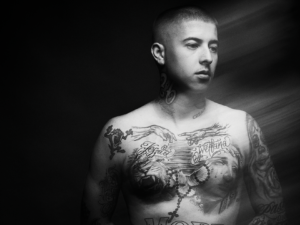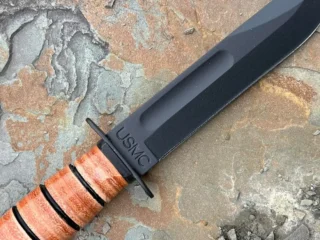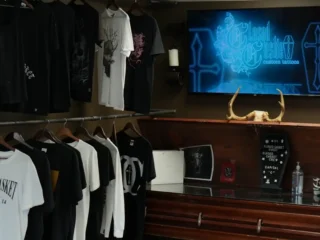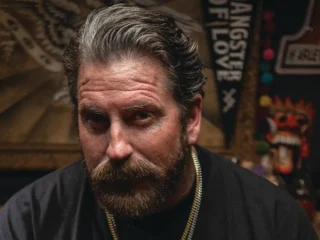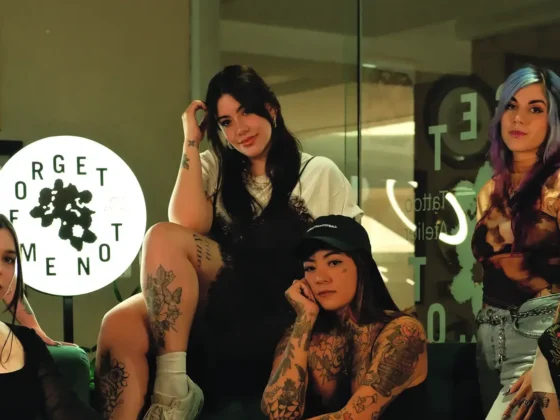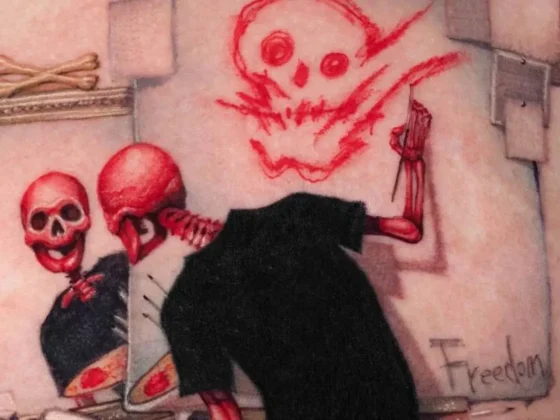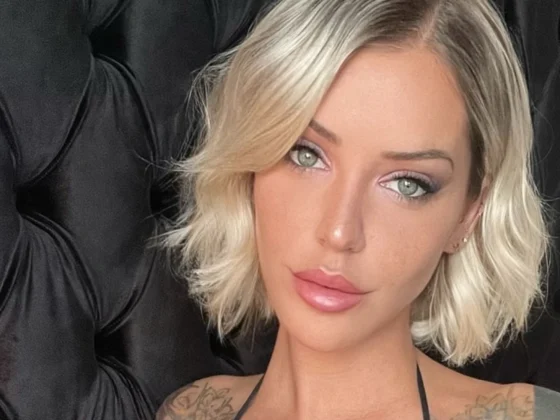Charlie Connell
May 25th, 2022
Mastodon
Created as the band was both reeling from losing their longtime friend and manager Nick John and cooped up dealing with the global pandemic, Mastodon’s “Hushed and Grim” deals with the grief and guilt that come in the wake of death.
Throughout the history of heavy music, most bands end up following a similar pattern. A band will break onto the scene with some innovative work in their first couple of albums, settle into a sound and, if we’re being quite honest, continue releasing albums with diminishing returns until they are finally relegated to the state fair circuit “playing the hits.” Not Mastodon.
The genre-defying four-piece will not go the way of their namesake that called it quits toward the end of the Pleistocene epoch. Over the course of two decades, the band have found a way to break the mold with each successive album. Mastodon could never be accused of being afraid to take a chance—their second record was a concept album based on Herman Melville’s “Moby Dick”—and for their eighth studio release they attempted something they swore they would never do: record a double album.
The aptly titled “Hushed and Grim” will stand as a testament to the time in which it was created. At the end of 2019, the group wrapped up a grueling two years of touring in support of “Emperor of Sand,” giving the band time to relax and spend a couple of months at home. Come February the four men—Brann Dailor (drums, vocals), Brent Hinds (lead guitar, vocals), Bill Kelliher (rhythm guitar, vocals) and Troy Sanders (bass, vocals)—were just getting ready to gear up for a new cycle. “We had gotten a bunch of songs together, we were starting to get excited and feeling a vibe,” Dailor says. “Then everything came to a halt.”

Mastodon had a couple of songs written prior to that first lockdown in March 2020, but the pall that fell over humanity’s collective psyche can be felt in the songs found on “Hushed and Grim.” Even for those who were not personally affected by the COVID virus, the world had profoundly changed almost overnight.
“The passage of time seemed different,” Dailor explains. “Everything slowed down and I feel like the album mirrored that. When you’re forced to stay home and be terrified of this easily spreadable thing… it was terror for everybody. It’s hard to really remember pain and those kind of things, or the terror that everyone felt, but I feel that all art created during the pandemic is going to be affected by it, whether you are conscious of it or not. I think the slower-paced songs and the longer passages had a lot to do with feelings of isolation, fear and the dragging on of the days.”
In addition to the global phenomenon, the foursome were dealing with a tragedy that hit much closer to home. Due to the relentless touring schedule they had undertaken, they never had time to fully process the loss of their manager, Nick John, who had passed away from cancer in 2018.
“It’s a record about grief,” Kelliher explains. “That was the state of mind we were in after our manager [passed]. I don’t write the lyrics but I do write most of the music, and it’s the mood I was in that put those riffs into my fingers.”
Part of what makes “Hushed and Grim” work as a double album is how cohesive it sounds throughout. Every song bleeds into the next, both tonally and thematically. The record avoids having any tracks that serve as filler, the type of throwaway songs that get included when a band really has just a one-and-a-quarter album as opposed to a true double album.
“It was a heavy time, it still kind of is, and everything we put on the record felt right at the time,” Dailor says. “There’s a lot of space there, a lot of it sounds a little different for us. We’d go in there and think, ‘Let’s play some death metal! Let’s play some crazy stuff!’ Then we’d sit down to do it and this is what was coming out. We knew that a vibe was being created. Sometimes you don’t have as much control over it as you think you do.
“You can have this big idea of what you think you’re going to put forth,” Dailor continues. “Then you get in there and something happens, so you gravitate toward it. The heart wants what the heart wants [laughs]. I do definitely remember that there was no room for anything happy.”
Kelliher is the kind of musician who always has a guitar in his hands and practically never stops thinking about the next riff. He likes to record them, throw them onto the computer and come back to them later. He considers himself to be more of a songwriter than a “jam and just fucking wing it kind of guy,” so he always likes to be prepared when he goes into the studio. And while it’s obviously advantageous to be prepared, having an encyclopedia of riffs to work through in the studio can take an enormous amount of time before even considering the cost. It was here where the band found a silver lining amidst the shitshow that was the pandemic—they had ample time to record in the studio that Kelliher helped build and co-owned.
“I’ve always wanted to have built my own studio and record in it,” Kelliher says. “And I think what made ‘Hushed and Grim’ so deep and layered and, to me, one of our most perfectly put-together albums is because we had that time. We didn’t have a deadline. Nobody told us we had to be out of the studio by this date because we got fucking Papa Roach coming in or whatever.”

They could come in whenever they wanted and work however many hours they desired to get things right, without having to spend an exorbitant amount of money to do so. Normally, the band records 10-12 songs to be able to knock it down to around eight for the final album. They went into the studio with 20 songs, eventually whittling them down to 15. Far too many for a single album.
“We were asking, which songs should we cut out?” Kelliher says. “They’re all very representative of our mood right now and what’s happening. We wrote all these songs at the same time, they go together as a story, they all have a mood… it was a bit of a struggle. So we just said, ‘Who says we have to take any out?’ This being our last album with Warner Bros., there was talk about not putting all our eggs in one basket and just fulfilling our commitment, but all four of us were like, ‘Fuck that. Every time we do a record it’s got to be the best, we’re not going to half-ass it just to please a record company. That’s not the way we work.’”
During the countless hours spent ruminating in the vibe they had created, the members of Mastodon were able to reflect on everything they were experiencing. All the grief that had built up was being put on the record, a true representation of where all four stood at the time.
“By the end of the record, once the lyrical content went on top of what I’d written,” Kelliher says, “I was like, ‘Oh yeah, this is fucking heavy. This is deep. This is fucking emotional. This is amazing.’”
“We were a little depressed and trying to work it out with these songs and these lyrics, we were trying to work through it,” Dailor says. “I don’t know if it’s cathartic or not, I just think it’s the process of understanding your own emotions and going through something tough, just like everybody else. Luckily, we have this band where we can explore that and put it out into the world. Maybe somebody will connect with it and it’ll do something good for them. That’s the hope, anyways.”
Of course, the album was done well before Mastodon was able to get onstage and share the new material with fans. After spending the bulk of their adult lives touring the world to make their living, they were stuck at home with no scheduled shows on the horizon. This would also take a psychic toll. Seeing the reaction from fans at a concert is a huge part of the deal, and losing that part of the equation made Kelliher question himself.
“I don’t feel like I’m an egotistical person, but this is the only way I can think about it,” he explains. “I’m just normal Bill when I’m at home, but I felt, like, extra normal [laughs]. For two years I was like, ‘Who am I? What am I fucking doing with my life? There’s no more music. No more live shows. What’s my backup plan here? How am I going to get my fix of playing onstage, how am I going to get that feeling back?’”

Dailor may be on the fence about whether or not the songwriting process is cathartic, but Kelliher adamantly believes the live experience has the power to replenish the soul. “It’s not gonna heal our wounds or the grief over our loss,” he explains. “I feel like when you carry that to the audience—those people are going through the same shit, everybody’s got their own personal battles—they let it out. I’ve seen people fucking weeping and smiling and singing along. It’s not background music to them, it’s, like, their medicine.
“And that makes me feel fucking awesome,” he continues. “It makes me feel like we’re this powerful entity when we’re projecting those songs. There’s no way to describe that feeling of ecstasy.”
It’s the emotionally complex nature of their music that fosters such a robust connection between Mastodon and their fans. You don’t see a lot of folks weeping to the stylings of whichever Travis Barker project the pop-punker kids are into this week. This is music for grown-ups who want to think about mature subject matter while banging their heads.
“Luckily, we have a large percentage of fans who are like, ‘I can’t control what Mastodon’s gonna do, I’m just here for it,’” Dailor says. “A lot of them seem to be into saying they understand what we’re going through and connecting to it. There’s a big payoff because we did put everything we had into this record.”
After extensively discussing everything the band had been through over the past couple of years emotionally, the mood of the conversation itself was hushed and grim. But once the topic of tattoos came up it shifted palpably, as the respective collections of both Dailor and Kelliher occupy the lighter side of life.
It would be a gross understatement to say Dailor has a mere affinity for clowns. He not only paints them prolifically, he has many clowns in his tattoo collection. There’s a little something for both those who love them and those who loathe them.
“One of the first tattoos I ever got was this vampire clown-looking thing,” Dailor says. “It was a flyer for a Wednesday night at the Limelight in New York City in, like, ’91. I was probably 16 and I just picked it up off the street. It was badass, I liked that clown. Two years later my friend Stephan put it on me, now it’s pretty old and faded but it’s still there.”
Kelliher’s tattoo collection doesn’t come from under the Big Top like his bandmate’s, but from a galaxy far, far away. His sleeve includes a whole cast of characters only true super fans would know by name—Grand Moff Tarkin, IG-88, Dengar, Bossk and Zuckuss among them—as well as many of the well-known characters like Princess Leia in her bikini from “Jedi.” It was the latter addition that proved useful later on. The guy inside the Bossk costume wouldn’t be appearing alongside him on the Jimmy Fallon show. It was Carrie Fisher.
“I told my manager, ‘I gotta meet her, gotta meet her, gotta meet her,’” Kelliher laughs. “I had to get a picture with her. She was tiny! And I showed her my tattoo: ‘Look, I have you tattooed on my arm!’ And she was like, ‘I don’t look like that anymore, honey. But I’m working on it!’”

The band have gotten tattooed on tour numerous times, including a semi-regrettable decision by Dailor to get a giant yeti blasted on his ribs. “It was a terrible idea,” Dailor laughs. “It was during the ‘Blood Mountain’ tour, we played that night then I sat for three or four hours getting tattooed on the ribs. It was a fucking nightmare. Then I had to play the next night and be on tour for the next three weeks. But it was Tim Lehi. If he wants to tattoo me, I’ve got time, I’m getting in there.”
But throughout all their travels, the four haven’t sat down to get a tattoo together. Dailor says maybe they’ll get around to it during the 25th anniversary of “Crack the Skye,” but he doesn’t sound overly confident. It is curious that they haven’t gotten collective ink, especially considering that one of Kelliher’s tattoos is directly responsible for the band’s moniker.
Among the aforementioned collection of Star Wars characters lies Kelliher’s first tattoo, done by Evan Conklin in Rochester, New York. Kelliher was late to the game and wasn’t sure what to get, but he was into collecting Star Wars figures.
“I have a Mythosaur, which Boba Fett has on the left arm of his Mandalorian armor,” Kelliher says. “I was wearing a wife beater and sitting next to Brent. He was on my left hand side and he was looking at it when we were coming up with band names. He goes, ‘What about that? What is that? Is that a woolly mammoth or something?’ I go, ‘Oh, you mean, like, a mastodon.’ And it clicked around the room. We all went, Mastodon. That’s the name of the band.
“If I didn’t have that tattoo, who knows what we would have been called,” he laughs. “We might have been called Tasmanian Devil.”
Obvious potential lawsuits aside, if they had called themselves Tasmanian Devil there’s no way they would be where they are today, making hard-hitting, emotionally complex metal. Their willingness to take their sound anywhere it needs to go in order to serve the material and their refusal to be bound in by genre gives Mastodon everything they need to avoid extinction.

Editor's Picks
Royal & The Serpent
The hilarious and talented musician talks mental health, music, tattoos and more
Son of a Sinner
From rough-and-tumble roots to mainstream stardom, this genre-crossing musician is on a roll
A Cut Above
Celebrated barber Vic Blends can charge whatever he wants for a haircut, but all he really wants in exchange is a conversation and human connection

